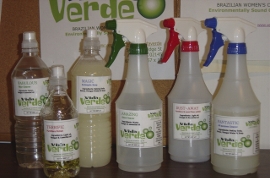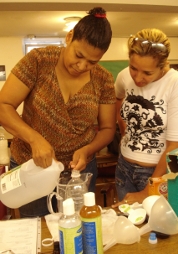Breathing Easier
By Marjorie Howard
With help from Engineering’s David Gute, area Brazilian house cleaners are healthier—and spreading the word

The Vida Verde co-op developed a line of homemade cleaning products that are safe and affordable, using simple ingredients such as baking soda, vinegar and borax.
You’re on your hands and knees scrubbing the bathroom floor. The harsh cleanser you are using irritates your nose and eyes and makes breathing difficult. Cleaning a bathroom is obviously not fun, but suppose you had to clean a couple of dozen each week, as many Brazilian women do for work in Massachusetts?
“Some cleaning products are irritants to the upper respiratory system,” says David M. Gute, an associate professor of civil and environmental engineering at Tufts. “The thing that’s quite different in the life of a professional cleaner as opposed to someone who cleans house occasionally is they do several houses a day. If you multiply that times five days a week, you’re quickly into a situation where the duration of exposure to these products is much more prolonged than it is for the homeowner’s sporadic use.”
Gute’s work in occupational health helped lead to the creation in 2006 of Vida Verde (Green Life), a co-op of Brazilian house cleaners in Somerville, Mass., who are trained to use non-toxic materials. By working together, the house cleaners are also developing a sense of community and learning about their rights as workers.
The co-op is one of several projects aimed at understanding occupational health risks among immigrant workers funded by a four-year, $900,000 grant from the National Institute for Occupational Safety and Health, for which Gute was the principal investigator. The co-op has also benefited from assistance from the Immigrant Service Providers Group/Health in Somerville, the University of Massachusetts at Lowell, the Massachusetts Coalition for Occupational Safety and Health and Tufts students.
Gute has long had an interest in the relationship between engineering and public health and has worked to apply engineering principles to the prevention of disease. His background is in epidemiology and public health and his work has ranged from looking at death certificates to understand more about occupational illness in Rhode Island to working to find ways to prevent the acquisition of schistosomiasis, a waterborne disease, in the eastern region of Ghana. He is also a strong believer in the ability of people to make decisions about their own lives and work, as the Brazilian co-op members have been able to do.
“It’s a compelling story,” says Gute, “in which Brazilian women have gotten together to change the way work is organized. The members have equal votes and make the decisions about the future of the co-op.”
Healthy Cleaning
The genesis of the co-op came from Monica Chianelli, an activist and member of the Brazilian Women’s Group, a community organization that advocates for women and now coordinates the co-op. Chianelli, who has since returned to Brazil, encouraged house cleaners to use natural products. “She knew of the risk to people’s health by using chemicals in cleaning, both for the house cleaner and the owner of the house,” says Heloisa Maria Galvão, who now heads the co-op.
With the help of Carlos Eduardo Siqueira, an assistant professor in UMass Lowell’s department of community health and sustainability, the co-op developed a line of homemade cleaning products that are safe and affordable, using simple ingredients such as baking soda, vinegar and borax. Siqueira arranged for the materials to be tested by the Toxic Use Reduction Institute’s laboratory and determined they clean as well as other products and are not harmful.
Gute learned about the Brazilian Women’s Group through his work with Somerville community organizations and met Chianelli, who complained that not only was the health of cleaning women being jeopardized, but some were also being exploited.
“The sad fact,” Gute says, “is that some of the particularly new arrivals are exploited in terms of being kept as what is known in the industry as ‘helpers,’ people who do not own the contract for the cleaning of the house but are hired hands. One of the initial motivations was for the co-op to offer protection to these recent arrivals in terms of improving their stature and ability to make ends meet.”
Gute emphasizes that the formation of the co-op was a collaboration between community and academic partners. Such work is part of an expanding area of research called community-based participatory research. “Instead of academics sitting at their round table in their cloistered environment coming up with ideas about what to do in terms of a target population or a community, they go outside and talk to the community and jointly arrive at what to do,” he says.

Co-op members Maria Aparecida Ribeiro and Eliane Evangelista (from left) mix the green cleaning supplies they will use.
The co-op now has 16 members, and eight more are being trained. New members are required to participate in meetings and learn about workers’ rights and health issues for six months. After this stage, which includes computer training and improving their English skills, they are then eligible to become full-fledged members.
The co-op sets the housecleaning rates, and the clients pay the members directly. The cleaners in turn give a small portion of their wages back to the co-op, which along with grant funding helps pay for a coordinator and other administrative expenses. Currently co-op members clean some 200 houses throughout the greater Boston area. The co-op will be completely self-sufficient, without the need for grants, when its members have a client list of around 400.
The co-op’s sustainability has been enhanced through recent grants. It received $30,000 from the Catholic Campaign for Human Development to help pay the co-op coordinator as well as to expand outreach and improve operational efficiency of its business operations. Also, the Toxic Use Reduction Institute awarded the co-op $15,000 to develop and broadcast a weekly radio show. Area Brazilians get much of their news from ethnic media, especially local radio, and the co-op managed to produce its first Portuguese show for a Chelsea, Mass., station within six weeks, Gute says.
Other Tufts faculty involved in the original $900,000 grant, which is in its final year, are Raymond Hyatt, assistant professor of public health and community medicine, and Mark Woodin and Anne Marie Desmarais, lecturers in civil and environmental engineering. In October projects associated with the core grant in immigrant occupational health work, including the Vida Verde co-op, will host a community event in Somerville to highlight accomplishments.
As for Vida Verde, the focus is on the results. Those bathrooms and floors are still getting clean, the cleaners report fewer health symptoms and their clients are happier. “The clients love the idea of using natural materials and that it’s a women’s co-op,” Galvão says, “and that we care about the environment.”
Marjorie Howard can be reached at marjorie.howard@tufts.edu.
